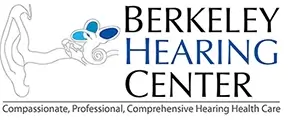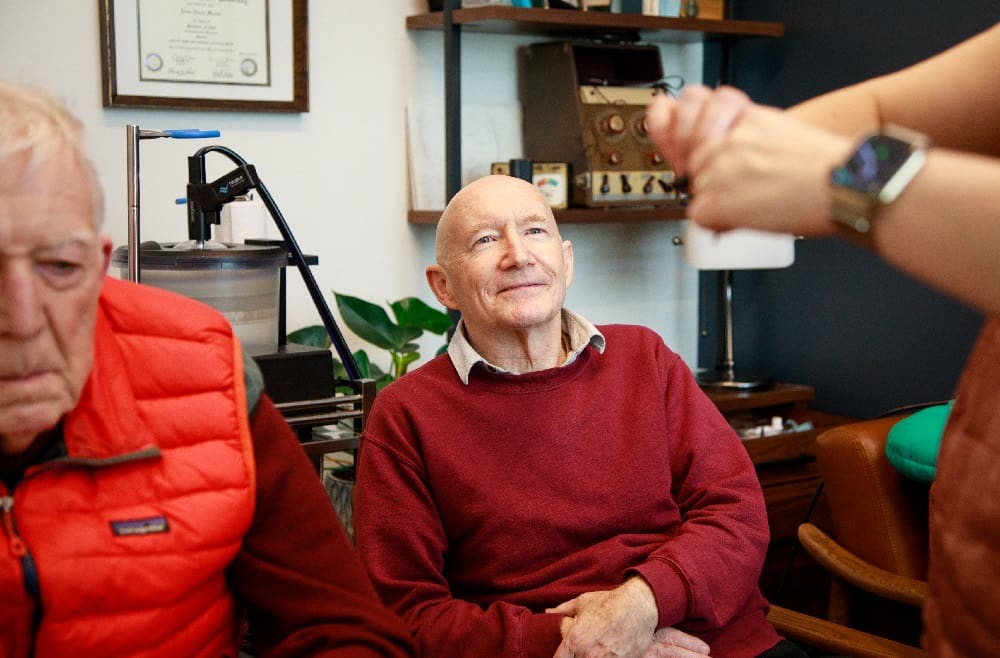2021-05-03
The Team at Berkeley Hearing Center
May is officially Better Hearing and Speech Month. The NIH (National Institutes of Health) uses these ‘official’ months to raise awareness of a particular public health issue.
A brief look at the numbers makes me think we should extend Better Hearing and Speech Month into June or July! Especially when you consider that only 12.9% of patients are screened for hearing loss at their yearly health checkup.
Thanks to decades of research, we understand a great deal about the physical, cognitive, social & financial benefits of early identification and treatment of hearing loss.
Just last year, one study tracked the difference made by simply adding the question “Do you have difficulty with your hearing?” to ten family medical clinics’ evaluation checklist for those older than 54.
[Audiology] referral rates in the family medicine clinics increased from a baseline rate of 3.2% to 14.4% in one health system and from a baseline rate of 0.7% to 4.7% in the other.
Certainly, we’re delighted to hear about studies like these because the percentage of people with hearing loss who do something about it are shockingly low.
NIH data reveals that fewer than 1 in 3 of those over 70 wear hearing aids, and only 1 in 6 of those ages 20 to 69 who could benefit from wearing them have ever used them. 28.8 million U.S. adults could benefit from using (properly fit) hearing aids!
How Hearing Loss Progresses
The first signs...
Hearing loss typically has a fairly insidious or subtle progression with early communication issues easily rationalized away by external factors (‘my wife mumbles,’ ‘nobody could hear in that much noise,’ ‘he covers his mouth when he speaks’).
So people often don’t notice hearing loss early on. But even when they do, on average, they wait for about ten years before seeking help.
Often, family/friends/colleagues will notice early hearing loss before the individual. However, as noted above, this delay between identification and treatment can have some significant long-term ramifications!
But over time, it becomes more and more obvious that something else is going on.
Hearing loss becomes more obvious...
A very simple checklist you or a loved one can use to assess the likelihood of hearing loss is below. Any could be indicative of hearing loss, but if you're answering ‘yes’ to three or more of the statements, a hearing assessment is definitely warranted:
I often need to ask people to repeat themselves.
I find it hard to hear where there’s a lot of background noise, such as in a movie theater or restaurant.
I sometimes or often mishear what people are saying.
I need the TV up louder than others in the home are comfortable with.
It sounds like people are mumbling instead of speaking clearly.
I find myself getting tired from the effort of trying to hear and understand what people are saying.
I’ve started to avoid going to social events because my inability to hear clearly is embarrassing, making me feel alone, despite being in a group.
My loved ones are starting to get frustrated with my hearing difficulties.
I’m finding it difficult to understand co-workers and clients or customers.
Some other potential signs of hearing loss can include:
I hear a buzzing or ringing in my ears.
I sometimes feel dizzy and off balance.
My ears ache sometimes.
What happens next…
Either help is sought out…or the individual continues to avoid asking for help, with too many people falling into the latter category.
What occurs above is how things might typically transpire. What we’re striving for is to utilize already existing tools within the healthcare system to start to identify hearing loss much earlier, when treatment is less expensive and facilitates better short, medium, and long-term outcomes.
We already screen for so many other potential health care issues. We need to include hearing loss screening as standard ‘best practices’ medicine.
How Better Hearing Health Begins
Hearing is checked beginning at age 50 (earlier, of course, if a patient complains of communication/hearing issues).
An otoscopic inspection will look for any anatomical and/or medical issues with the ear, ear canal, and eardrum.
A comprehensive hearing evaluation, pure-tone testing air & bone conduction, speech testing (quiet & noise), and impedance audiometry will identify early hearing loss and establish a baseline. These tests are easy to administer and non-invasive.
It’s important to not only audiometrically evaluate hearing but also to take a thorough medical history and assess the subjective perception of a person’s hearing and how it impacts their communication situations.
Therefore, questionnaires should be employed that assess how an individual’s hearing affects them (such as the Hearing Handicap Inventory for Adults-HHIA) and evaluates the perceived benefits of treatment with amplification (such as the Client Oriented Scale of Improvement-COSI or Abbreviated Profile of Hearing Aid Benefit-APHAB).
Here at Berkeley Hearing Center, we also incorporate Cognivue. Because of the strong correlation between hearing loss and cognitive decline, Cognivue provides our clinicians objective measurements of cognitive function that can be monitored over time.
It is a screening tool to identify a potential decline in cognitive function relative to baseline test performance of other age-normal adults. If indicated, we can then refer those patients for appropriate diagnostic testing and treatment.
Book a hearing assessment with the Berkeley Hearing Center team!
If your hearing assessment reveals hearing loss, we’ll take the time to explain everything about it, answer your questions and (together) develop the best possible solution to address your current hearing/communication issues and reduce the potential for future decline.
This may or may not be in the form of hearing aids. Though not typical, hearing loss might be caused by infection, an accumulation of earwax, or some other medical issue.
While we can address wax issues here in the office, other medical issues identified can be referred to for treatment by an ENT physician.
If amplification (i.e., hearing aids) is indicated, we have a number of state-of-the-art treatment options available from all major manufacturers that we can recommend based on each individual’s specific hearing loss, communication issues/needs, physical capabilities, budget, and lifestyle.
It’s never too late to address hearing loss. If you’d like to check for hearing loss, or if you’re concerned about a loved one’s hearing, please contact the team at Berkeley Hearing Center. We’ll be honored to help you!
The Team at Berkeley Hearing Center






